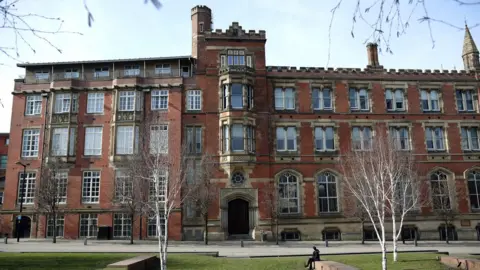Child sexual abuse: Call to force residential schools to report allegations
 Christopher Furlong/Getty
Christopher Furlong/GettySome staff at residential schools overlooked abuse because they were more focused on the school's reputation than children's interests, an inquiry says.
The Independent Inquiry into Child Sexual Abuse recommended England and Wales reintroduce a duty to inform school inspectors of abuse claims.
It examined cases such as Chetham's School of Music, where several members of staff abused children over decades.
Boarding schools are "the ideal environment for grooming", it warned.
After investigating the response to abuse at elite residential music schools, residential special schools, private boarding schools and state schools, it concluded that boarders may be more vulnerable because they are emotionally isolated and dependent on the adult staff.
But the inquiry found that poor leadership often meant that staff were unaware of how to respond to concerns about sexual abuse or too afraid of the consequences of speaking out.
Inquiry chair Prof Alexis Jay said that "in some cases, it was clear that protecting the reputation of the school was prioritised over the protection of children from sexual abuse", calling it a recurring theme of the inquiry.
The inquiry's report recommended governments in England and Wales reintroduce a duty to inform school inspectors of child abuse allegations or other serious incidents - with regulators ensuring consequences for staff who fail to do so.
Despite improvements in safeguarding over the last 20 years, the report found children continue to face sexual abuse and harassment in schools, with testimonies on the Everyone's Invited website suggesting that between children such incidents are "endemic".
At the specialist music schools, the report found "the power and influence of often revered and influential music teachers made some pupils even more vulnerable to being sexually abused by them".
It found similar concerns at other schools with "well-liked and generally respected members of staff", where their reputations were seen as more important than the allegations raised by potential victims.
'Cover-up'
At Chetham's in Manchester, the inquiry heard the extent of the abuse came to light after former pupil Frances Andrade took her own life in 2013.
She had given evidence about her grooming and abuse at the trial of Michael Brewer, the former director of music and "a powerful figure" at the school.
Brewer admitted there had been a "cover-up" at the school of another sexual relationship with a pupil in 1994. Because she was over 16, it was not an offence at the time.
A police inquiry eventually uncovered 37 alleged perpetrators at the school, many of whom had died and could not be prosecuted.
One other man was convicted of sexual offences and one was shot by US police carrying out an extradition request relating to 77 abuse charges.
Another was acquitted but was later judged to have abused a former pupil by a civil court, which found that the school "facilitated" the attacks.
Chetham's said in a statement that "our school can never apologise enough" for the abuse and its failure to respond and said "nationwide change must follow this report".
'Completely flawed'
The inquiry also examined failings at Stony Dean School in Buckinghamshire, a special school that formerly had residential facilities.
After head of care Malcolm Stride was convicted of sexual offences at a previous school, a pupil also made allegations about his successor, Anthony Bulley, in 2002.
A "completely flawed" investigation meant Bulley returned to the school to continue his abuse for another two years.
After a serious case review in 2009, Buckinghamshire County Council acknowledged its failure to admit its mistakes and apologise.
But 12 years later, the inquiry found it had still not apologised to the first victim to report Bulley.
The inquiry also recommended setting national standards for safeguarding training in schools, as well as making the highest level of training compulsory for headteachers, school owners, and safeguarding leads on the staff and governing body.
If you're affected by any of the issues in this report, you can find details of support organisations through BBC Action Line.


